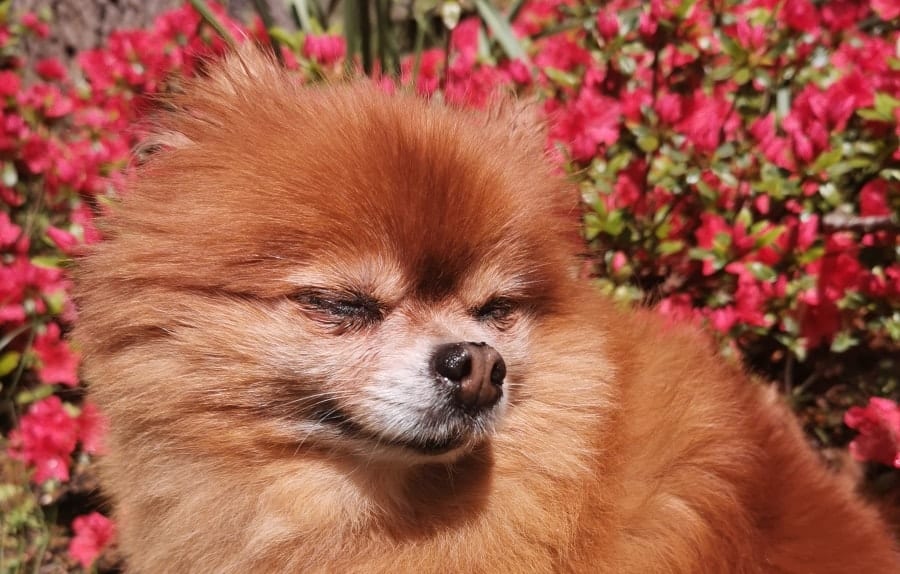Pomeranians are a great breed of dogs. Their small size means they can live in apartments or in houses, in cities or in the country. They are friendly and happy, making them endearing companions for any age. Finding a good Pomeranian breeder is key to your Pomeranian’s temperament, health, and quality of life.
So, how can you find a good Pomeranian breeder? It’s easy to find a good Pomeranian breeder and puppy if you know which questions to ask, the qualifications of a good breeder, and what physical signs to check on the puppy.
In looking for a Pomeranian breeder, you need to be vigilant so you’re not accidentally helping to fund the money-hungry pet trade industry. Follow the steps below to make sure you are picking a good breeder.
How to Find a Good Pomeranian Breeder
Finding a good Pomeranian breeder is key to a healthy, happy puppy. There are a lot of puppy mills disguised as a backyard family breeder, so if you think a breeder may be a part of a puppy mill, walk away.
Don’t purchase a puppy from them to “save” the puppy”. This will only continue to financially support the money-hungry pet trade industry. Make sure you ask the right questions when you are talking with the breeder to ensure the legitimacy.
Questions to ask to determine if the breeder is legitimate:
- Will I be able to visit the puppies in person?
- Are there always puppies available for sale?
- Are your dogs always registered with the kennel club?
- Can I see the puppy’s pedigree?
A good breeder will allow you to schedule a visit to see the puppies and the space the puppies are living in. This allows you to physically see the puppies and to check out their living space. It also allows you the opportunity to check out the parents.
It’s important to see and learn more about the puppy’s parents and their pedigree. This is important to look at so you can see the health of the parents and potentially catch some red flag health and welfare issues.
The breeder should be happy to share information about the pedigree and share documents to support what they are saying.
Pomeranian litters are typically only between one to five puppies per litter, which is on the smaller litter size for dogs. If a breeder says they always have puppies available, then this is likely a puppy mill.
Most good breeders will register their puppies with the American Kennel Club, but not being a certified member is not necessarily a disqualification. For one reason or another, some breeders decide not to register their puppies.
This may be because they don’t show their dogs or it’s just not a priority. This doesn’t necessarily make them a bad breeder. There are many puppy mills who register all their puppies in the American Kennel Club.
It is important to ask if the dogs are registered. If the answer is no, follow up with asking why they chose to not register the dogs. Be sure to be vigilant and ask all the questions to carefully assess the breeder.
The Qualifications of a Good Pomeranian Breeder
It is not necessary for a breeder to have a college degree, although some breeders do have a degree in animal science, biology, or animal reproduction. What is important is that the breeder have a complete understanding of the Pomeranian breed.
They should be able to explain typical temperament, grooming techniques, common health issues of the breed, and what to keep an eye on. Good breeders will truly care for their breeding animals as well as the puppies they are selling. Take a close look at the additional qualifications of a good breeder.
Good breeders will:
- Carefully select the animals used for breeding.
- Have a close relationship with their veterinarian and will be able to provide documentation of all the puppy’s vaccinations and vet visits.
- Allow you to come visit the puppies and parents in the place the puppies were born.
- Take the time to answer your questions and not rush you into a sale.
- Ask questions about you.
- Not let the puppy go home with you until the puppy is at least 8 weeks old when the puppy is ready to be weaned from their mom.
A good breeder will be selective with the animals they use for breeding. They will also have their breeding animals genetically tested. This genetic testing should be available to any potential person looking to purchase a puppy from the breeder.
Creating trust is important for a good breeder. They can show this trust by sharing documentation about the puppy’s veterinarian visits, including vaccinations the puppy has had. The recommended vaccinations for 6- to 8-week-old puppies include distemper and parainfluenza. The optional vaccinations at the age include Bordetella.
Always make sure to see the parents. A good breeder will be happy to show of the parents and talk about the puppy’s pedigree. If the mom is not around, especially if you’ve stopped by a few times, this is a sign that the puppy was not bred on site.
The breeder will want to take time to get to know you and allow you the time you need to ask all the questions you have. They understand you want to make the best decision in picking your puppy, and they want to ensure they are sending their puppy to a good home. A good breeder will never rush you into a sale.
Pomeranian breeders are in it for more than the money – they truly care about the puppies. If the breeder is pushy and tries to make the sale right away, be weary. A pushy breeder may be a sign that this is a puppy mill.
How to Choose a Pomeranian Puppy
Once you have found the breeder, it’s time to take a close look at the puppies and pick a healthy and happy puppy that is right for you and your family.
An American Kennel Club registration does not guarantee that a puppy is healthy or happy, or what the puppy’s quality of life will be.
Make sure to physically check the puppy and spend some time playing with them and watching how they interact with their siblings and their environment. And then pick up your puppy and physically check it.
Physical signs to check:
- Pay close attention to the weight of the puppy.
- Check the puppy’s eyes.
- Look at their bottom.
- Make sure to check the puppy’s nose.
- Take a close look at the puppy’s teeth and gums.
- The puppy’s coat should feel full and look healthy.
- Check for fleas or mites.
- Make sure to check the puppy’s ears.
- Pay close attention to the puppy’s activity level.
Pay close attention to the puppy’s weight. The puppy should not be overweight or underweight. If a puppy appears thin but has a large belly, this is a sign of worms.
The eyes and nose can help you determine if there are health issues. The eyes should be bright and attentive. Avoid puppies who have cloudy eyes. This is a sign that there are health issues with the puppy. There should be no sign of discharge from the puppy’s nose, which could mean the puppy is sick.
The puppy’s bottom can also be an indicator of illness. The puppy’s bottom should not appear red or sore. If the bottom is red or dirty, it is a sign of stomach issues or a more serious illness.
Check the puppy’s teeth and gums. Make sure the puppy’s bite is normal. The gums should be a healthy pink color – they should not be red or appear irritated.
Make sure to run your hand through the puppy’s coat, checking around the tail to look for signs of fleas or mites. Mites may look like dandruff.
A red ear or one with black dust is a sign of ear mites. This is a red flag and a sign that you should avoid both the puppy and the breeder.
Healthy puppies will be inquisitive and playful. A lethargic puppy is a sign of health issues. Pomeranians are inquisitive by nature and a smart breed. A puppy should not be overly skittish.
An overly skittish puppy could mean the puppy will not adapt well in a new environment or be good with children. It may also mean the puppy may not actually be living in the best environment right now.
Tips for Your First Time Using a Pomeranian Breeder
Be prepared to sign a puppy sale contract when purchasing a puppy from a breeder. A puppy sale contract helps ensure the puppy is being placed in a good home. It will outline what will happen if for some reason you are unable to keep the puppy.
The contract should have a section that outlines what to do in this scenario. This ensures the breeders that their puppies don’t end up in an animal shelter or passed from owner to owner. Good breeders want to ensure their puppies live good lives.
Contracts are also more common if the puppy is coming from a family of show dogs, but many breeders do supply a contract outlining their guidelines. Both parties should receive a copy of the signed contract.
Typical things you’ll find in a puppy sale contract:
- Confirmation that the puppy will be living with you.
- What the expectations are if you are unable to keep the puppy.
- Stipulation on breeding rights.
- Health and wellness guideline and statement.
After spending the time to work with you, the breeder wants to ensure you are not selling the puppy to someone else. A good breeder cares about their puppies and wants to ensure they are going to a good home. They don’t want you to turn around and sell the puppy elsewhere.
If for some reason you are unable to keep the puppy, many breeders will require that you return the puppy to them. However, you may or may not get a refund. It should be outlined if and when a refund will be given. Usually it is following a certain timeframe after the sale, or the age of the dog.
You’ll have to discuss with your breeder what their stipulations are on breeding rights. Some breeders don’t want you to breed the dog without purchasing additional breeding rights. If you want to breed the puppy, make sure to have an open conversation with the breeder before you get to the purchasing stage.
The health and wellness guidelines and statement will include that it is the buyer’s responsibility to keep the puppy up to date on vaccinations and veterinarian wellness checks.
It will also outline and include an acknowledgment of disclosure of the puppy’s health prior to sale, and what documents were shown to support the puppy’s health prior to sale.
Even when coming from a good breeder with a good breeding animal pedigree, puppies can still get sick. This ensures that the breeder did what they were supposed to do ahead of the sale to ensure a healthy puppy.





